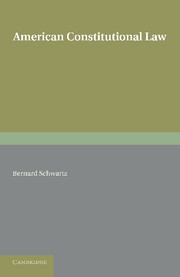Book contents
- Frontmatter
- Dedication
- Contents
- Foreword
- Preface
- PART I THE STRUCTURE
- Chapter I The Bases of the American System
- Chapter II The Federal System
- Chapter III The Congress
- Chapter IV The President
- Chapter V The Courts
- PART II MODERN DEVELOPMENTS
- Appendix: Constitution of the United States of America
- Index of Cases
- General Index
Chapter I - The Bases of the American System
from PART I - THE STRUCTURE
Published online by Cambridge University Press: 05 June 2016
- Frontmatter
- Dedication
- Contents
- Foreword
- Preface
- PART I THE STRUCTURE
- Chapter I The Bases of the American System
- Chapter II The Federal System
- Chapter III The Congress
- Chapter IV The President
- Chapter V The Courts
- PART II MODERN DEVELOPMENTS
- Appendix: Constitution of the United States of America
- Index of Cases
- General Index
Summary
English writers on constitutional law, reads a well-known passage by A. V. Dicey, have ‘good reason to envy professors who belong to countries, such as… the United States, endowed with constitutions of which the terms are to be found in printed documents, known to all citizens and accessible to every man who is able to read. Whatever may be the advantages of a so-called “unwritten” constitution, its existence imposes special difficulties on teachers bound to expound its provisions. Anyone will see that this is so who compares for a moment the position of writers, such as Kent or Story, who commented on the constitution of America, with the situation of any person who undertakes to give instruction in the constitutional law of England.’ American jurists, asserts Dicey, who have written upon constitutional law, have known precisely what was the subject of their work. ‘Their task as commentators of the constitution was in kind exactly similar to the task of commenting on any other branch of American jurisprudence. The American lawyer has to ascertain the meaning of the articles of the constitution in the same way in which he tries to elicit the meaning of any other enactment…. The task, in short, which lay before the great American commentators was the explanation of a definite legal document in accordance with the received canons of legal interpretation.’
It is, however, a mistake to assume that constitutional law in a country governed by a written organic instrument, such as the American Constitution, involves solely an application of the legal canons of construction. It may be, as the United States Supreme Court stated almost a generation ago, that ‘When an act of Congress is appropriately challenged in the courts as not conforming to the constitutional mandate the judicial branch of the Government has only one duty,—to lay the article of the Constitution which is invoked beside the statute which is challenged and to decide whether the latter squares with the former.’
But this picture of American constitutional law as only a mechanical process akin to the judicial construction of a contract or a will, though true in some cases, is at variance with reality in the majority of instances. The American Constitution does not purport to prescribe its provisions in minute detail.
- Type
- Chapter
- Information
- American Constitutional Law , pp. 3 - 26Publisher: Cambridge University PressPrint publication year: 2013



